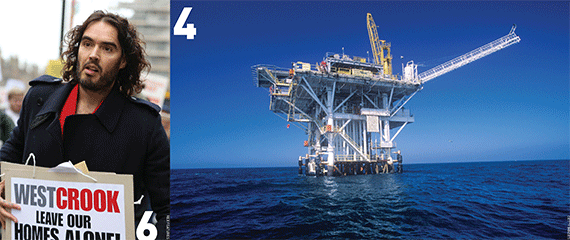Politics and technology will do much to determine the course of 2015. Meanwhile partnerships, rather than individuals, will be principal agents of change. Putting aside the risk of external shocks, here is the ultimate guide to the ones to watch over the next 12 months
50 Robots
The speed of technological advance could see machines and robots taking over a swathe of skilled human roles over the next 25 years. Future economist Graeme Maxton warns that real estate will have to respond to this second machine age: “If I were a developer I would not be developing for occupiers such as auditors or accountants right now, but for occupiers in fields that require independent thought.”
49 Ian Springett
Chief executive, Onthemarket.com
With an aggressive approach designed to take business from established portals Rightmove and Zoopla, Onthemarket.com is causing a stir. Agents including Savills, Knight Frank and Chestertons formed Agents’ Mutual to launch it and hired Springett, who set up PrimeLocation in 2000, to do the job. Some 4,600 branches had signed up by the launch. The battle has only just begun.
48 Sam Vasili
Real estate analyst, Google
For the property sector, Google’s power stems as much from its future real estate plans as it does from the fact that the company is one of the biggest and most powerful in the world. Where Google is set to go next is a big deal. Vasili is the group’s 20-something real estate portfolio planner for EMEA – managing future space requirements and portfolio metrics. Watch this space.
47 Lord Neuberger of Abbotsbury
President, the Supreme Court
The former property QC delivered the Supreme Court’s leading judgment in a number of property cases in 2014, including the hugely significant Lawrence v Coventry. This year, he is likely to bring his experience to bear on a number of other keenly anticipated cases, including Woolway v Mazars (rating) and Marks & Spencer plc v BNP Paribas Securities Services Trust Co (Jersey) Ltd (break clauses).
46 Andrew Jones,
London Metric
He is the man who can quote Warren Buffet at the drop of a hat and who, after reversing his Metric Property into his former mentors London & Stamford, has created a £1bn business that has shifted out of London offices and residential to the world of retail distribution. And if there’s a man that knows retail, it is definitely Mr Jones.
45 Matt Crompton and Nigel Franklin
Joint managing directors of Muse Developments
With a portfolio of 40 jv developments and two national strategic partnerships – one with the Canal and River Trust, the other with Legal & General and the Homes and Communities Agency – Muse is making its presence felt in the regions. The EG Awards judges were so impressed by this (still relatively) small fish that Muse was crowned National Property Company of the Year, beating Land Securities, British Land and the Crown Estate.
44 Matthew Weiner
Executive director, Development Securities
Development Securities has announced that its long-serving chief executive, Michael Marx, will retire later this year. All eyes will be on executive director Matthew Weiner when he takes over, particularly after the acquisition of Cathedral Group for £20.9m last May – and now that the group has become the first company to benefit from Transport for London’s new push to exploit its property portfolio, striking a deal to build more than 300 homes above Southwark underground station.
43 Graeme Craig and Francis Salway
Director of commercial development, TfL; chairman, TfL’s non-executive property advisory group
Transport for London wants to extract value from its vast estate by delivering more than 10m sq ft of development and is now on the hunt for the right private sector partners. Commercial director Craig is the driving force behind this initiative and has brought former Land Securities chief executive Salway on board to help. Shrewd move.
42 Dave Lewis
Chief executive, Tesco
The supermarket’s HQ in Cheshunt is for the chop, 43 stores are being axed and 49 developments are being scrapped. Drastic Dave, who took the helm last July, is leading Tesco’s fightback and the effect is being felt – not least by the local authorities that now have to rethink development plans. Then there is the future of that famous landbank…
41 Mark Carney
Governor, the Bank of England
The Canadian is running the London Marathon in aid of Cancer Research next month. Carney ran the 2011 Ottawa Marathon in three hours 48 minutes and his similarly steady approach to running the BoE continues to comfort the property industry. Last month, the BoE forecast that this year the UK economy would enjoy its fastest growth since 2006, helped by the lowest oil prices in almost six years. Inflation could soon fall below zero, raising the possibility that the BoE rate-setters may drop interest rates below 0.5%. However, the calm Canadian said the BoE was more likely to raise rates than loosen policy. Not exactly the guidance the property industry would like to hear – but guidance, nonetheless.
40 Twitter watchers, lurkers and ghosts
Plenty of propco chief executives have Twitter accounts, but few dare to tweet. David Sleath, we salute you. So we predict that 2015 will be the year when the Twitter watchers, lurkers and ghosts step out of the shadows.
39 Eric van der Kleij
Canary Wharf’s Level39
With Level39 established as the largest fintech accelerator in Europe, Van der Kleij and Canary Wharf are ready to deliver the next stage in their tech vision: creating a hub for a wider range of tech companies that could help make cities more efficient, smarter and more pleasant to live in. Their Cognicity programme offers support to get products to market as quickly as possible.
38 Juliette Morgan and Faisal Butt
Pi Labs
Europe’s first property-focused accelerator has opened its trendy east London doors to support the growing number of disruptors trying to break into the property market by giving them access to investment, mentoring and business space. Pi Labs was dreamt up by Cushman & Wakefield’s tech guru Morgan and entrepreneur Butt, chief executive of James Caan’s investment company, Spire Ventures. It is supported by a strategic partnership between the two firms.
37 Sir Howard Davies
Chairman, RBS and the Airports Commission
The failure of successive governments to provide the South East with extra runway capacity has never been so keenly felt. A recent CBI-KPMG survey showed that 49% of all businesses consider air connections with emerging markets as either critical or important in their choice of investment location. The next government will soon receive Davies’s recommendation on which of the three shortlisted proposals (two at Heathrow and one at Gatwick) should go ahead. And Davies returns to his financial roots in October, when he becomes chairman of RBS.
36 Sir Albert Bore
Leader, Birmingham city council
The head of Europe’s largest local authority continues to throw his weight behind initiatives including the £600m redevelopment of New Street station, which opens later this year and includes the new Grand Central shopping centre. Last month Bore unveiled plans for the £600m re‑masterplanning of the Snow Hill station area, which he hopes will attract further major inward investment. The 20-year improvement proposal is the latest part of Birmingham’s Big City Plan, set out in 2010, and follows a deal with Westminster to add £21.4m to the city’s £357m local growth funding. Bore is focusing on big-ticket projects, including the next stage of HS2, redevelopment of the Wholesale Markets site and a Life Sciences cluster at Selly Oak.
35 The Core Cities group
The UK’s 11 biggest cities outside London want a major new wave of devolution to give them the power and funding enjoyed by their counterparts in mainland Europe, the US and Asia. Made up of nine council leaders (from Birmingham, Cardiff, Edinburgh, Glasgow, Leeds, Manchester, Newcastle, Nottingham and Sheffield), plus the mayors of Bristol and Liverpool, the group launched its Charter for Local Freedom in February and has been gaining support from a wide range of local authorities.
34 Sir Terry Farrell
Who topped the PM’s list for a new design panel for the Starter Home Initiative announced in December? Farrell, of course. In fact, it seems there are few areas of our built environment where the architect and pioneer of city masterplanning does not have top-level influence. The government-commissioned Farrell review, published last year, calls for measures to make the planning system more proactive and was positively met. How any future government responds should become clearer this year.
33 Mike Hussey
Almacantar
Mike Hussey and Almacantar continued their multi-pronged assault on London in 2014. The firm has now secured planning consent on the mega-makeover of Marble Arch Tower, W1, and has started work on the conversion of the iconic Centre Point tower, WC1, into luxury flats. The legal debacle that has tied up the 1.5m sq ft Shell Centre scheme – where Almacantar is under offer to buy the partially let office element – appears also to be finally at its end, which should mean the firm’s huge ambitions are finally realised in concrete (and glass and steel) this year.
32 Sir Edward Lister
Chief of staff and deputy mayor of London for policy and planning
During the London mayor’s recent trade mission to the US, Lister saw first-hand how the vast Hudson Yards scheme in Manhattan is being developed over a working rail yard. He wants the redevelopment around London’s Euston station to draw on this blueprint to deliver almost 4,000 homes and 14,000 jobs – his two areas of priority. The man who really makes things happen in London, Lister will continue to wield considerable influence until the London mayoral election next year. And even though Boris Johnson is standing down as mayor next year, Lister – who won the EG London Award in December – will no doubt continue to be an influential figure in the capital’s development.
31 Dan Van Gelder
Founding director, Exemplar Property, and chair of Westminster Property Association
It would have been easy to stay silent on the empty building credit row between central and local government. But WPA chairman Van Gelder understood the threat to property’s often tarnished reputation and waded in, saying that developers converting vacant buildings into homes were not looking for a cut in affordable housing contributions. The row is still playing out. Van Gelder’s day job as boss of one of the UK’s most active private developers also keeps him on this list.
30 Rohan Silva
Second Home
The man who elevated a group of start-ups around Silicon Roundabout to the highest levels of government policy has a new project. Silva, David Cameron’s former tech adviser, launched Second Home out of 25,000 sq ft in Shoreditch last year. Backed by high-profile investors, it acts as a members’ club and workspace provider for entrepreneurs and creative businesses and is now home to accelerator Pi Labs. Expect to see expansion and copycats.
29 Robert Davis
Deputy leader and cabinet member for the built environment, Westminster city council
Westminster city council stands to lose hundreds of millions of pounds from its affordable housing pot if the government insists on sticking with its ill-conceived empty building credit. The tenacious Davis is involved in development across the borough and is effectively leading local government’s battle against the credit, which has sent local authorities into a fury. Knowing Davis, he will not give up until the government rethinks.
28 Tony Gibbon and Tony McCurley
GM Real Estate
Will they or won’t they? It is the deal that could never happen: a takeover of GM Real Estate – the broker set up by Tony Gibbon and Tony McCurley in 2010 – by Colliers International. With their track record as the agents behind billions of pounds of high-profile London deals, we imagine it will be Gibbon and McCurley calling the shots in any negotiations with Colliers boss Tony Horrell.
27 Google and Amazon
Tech giants
From big HQ plans and tax avoidance to revolutionising the way we live, work, play and shop, Google and Amazon have a lot in common. Amazon has, however, been more decisive about its HQ plans. From 2017, it will house some 5,000 staff at Brookfield’s 600,000 sq ft Principal Place, EC2, making it the biggest occupier in the tech heartland of Shoreditch. Google is taking the 400,000 sq ft building being developed by BNP Paribas at King’s Cross and is rethinking its 1m sq ft groundscraper plan.
26 Online shopping
“As retailers adapt to the new landscape, the property market will need to follow suit,” wrote former M&S property boss Clem Constantine on these pages at the start of the year. The growth of online shopping means all retailers are looking to expand their online businesses, while store portfolios will inevitably shrink. The implications for secondary and tertiary retail property are dire, but retailers will want showroom-style stores in the right locations to build brand recognition. The multi-channel world has arrived. So, landlords will need to evolve their approach to rents. Should they ask for a share from web sales? Or a top-up, based on regional performance?
25 Alex Midgen
Global co-head of Rothschild’s real estate advisory business
In the very public sniping that went on during the takeover bid for Canary Wharf, the Qatar Investment Authority demanded that its parent, Songbird, drop Rothschild as its adviser. Why? Because Midgen was advising Songbird on the deal and had a seat on the board of the firm as a nominee for major investor Glick Entities. Songbird denied there was any conflict and held on to Midgen. With the deal done, he has now left the board. But his involvement in just about every big deal puts him on this list.
24 Tony Pidgley CBE
Chairman, Berkeley Group
With housing at the forefront of the election campaign, the market is waiting to see how the next government will tackle the thorny issues of lack of supply and more stringent mortgage lending criteria. As the bellwether of the housebuilders, Berkeley’s response to any new policies will be keenly watched.
23 David Sleath
Chief executive, SEGRO
In four years as chief executive, 53-year-old David Sleath has engineered a sea change at industrial giant SEGRO. Ahead of the curve in steering away from offices to high-spec multilet sheds, SEGRO has become a dominant force in West London and Heathrow, known as much for best-in-class development as for almost instant prelets. If the pace of corporate takeover has been slower than desired, organic growth is motoring on, with SEGRO winning coveted sites in the UK and Europe.
22 Westfield
The Aussie shopping centre giant has cornered the London malls market. With mega shopping centres in White City, W12, and Stratford, E15, the developer has turned millions of shoppers into Westfieldites. The Westfield effect turned once-unloved areas of the capital into major destinations. Next on the list is its attempt (and probable success) at giving Croydon the facelift it so badly needs.
21 John Burns
Chief executive, Derwent London
The sage of Shoreditch continues to be the go-to man running the go-to company for successful east London fringe development. From major blue-chip competitors to the freshest of emerging start-ups, the Derwent name is synonymous with the sort of industrial-style office design that attracts top tenants. Burns puts a degree of the group’s success down to the power of the “Derwent brand” and has plans to move further west in 2015 and beyond. He concedes the group missed a trick not going south of the river earlier and all eyes will be on the developer this year to see if it takes the plunge.
20 Melanie Leech
BPF chief executive
Her predecessor, Liz Peace, was a vital mouthpiece for the property industry, lobbying government for policy and legislative change. Leech has made a promising start as her replacement, quickly showing her grasp of key issues, from the effect of retail administrations on landlords to the challenges facing the growth of the PRS. This could be her year if she steps up to leverage the honeymoon period and gets ready to make a real impact immediately after the general election.
19 Ken Caplan
Global investment officer, Blackstone
Deal-maker Caplan, part of Jon Gray’s close-knit team at the all-pervading Blackstone, just got even more important. The former head of real estate has stepped up to the new role of global investment officer. Last year’s £448m deal to buy Nick Leslau’s AIM-listed Max Property Group has heightened expectations that Blackstone could look to turn its European industrial platform into a new REIT. Blackstone’s growing central London portfolio, to which it recently added the former stock exchange tower at 125 Old Broad Street, EC2, for £320m, could also be listed in the future.
18 Nigel Hugill and Robin Butler
Executive chairman and MD, Urban & Civic
Urban & Civic’s reverse-takeover of quoted Terrace Hill last May has got off to a dream start. Renowned for his involvement in such projects as White City, Stratford and Greenwich Peninsula, former Chelsfield man Hugill has been muscling in on some of the most hotly contested regional projects in the UK. The merged outfit quickly won the 6,500-home Waterbeach Barracks site, worth £2.2bn, and then Manchester’s Origin and Ramada sites – widely billed as the best development land in the North West. Last week it bought land business Catesby. Expect more deals to come from a new Mayfair HQ.
17 The disruptors
The property sector is not always known for being all that receptive to change. But what happens when it does not have a choice? Meet the disruptors – the start-ups who are not afraid to challenge the norm and shake up the industry. From Reza Merchant (pictured), the 25-year-old redefining shared living, to the duo specialising in turning abandoned retail space into unusual but affordable London residential developments, the property world is changing. Make sure you keep up.
16 Freehold and diversity
When 17% of the property sector feels discriminated against at work – based on their gender, sexuality, age, race or disability – something has to change. Thankfully this shocking figure, revealed in the 2014 EG Salary Survey, is only half of the story. Great progress has been made on diversity issues in real estate, thanks to groups such as Freehold, property and construction’s LGBT networking group, and Women in Property among others. The power of those prepared to speak out should not be underestimated in 2015 and beyond.
15 Lord Heseltine and Greg Clark
Politicians
By now a familiar double-act in the property sector, Heseltine and Clark have been delivering the £6bn of local growth deals. Both are committed to devolving further power and financial control to a local level. As architects of devolution, their influence will surely continue to be felt after the general election.
14 Alex Jeffrey
Chief executive, M&G Investments
Admirers describe M&G Real Estate as one of the few funders out there actually doing something. It is not difficult to see why. With Jeffrey at the helm, M&G bought and sold around £4bn of property in
the UK, Europe and Asia last year, bringing total transactions for the past two years to £7.3bn. Already this year, it
has shown further commitment to the UK regions – buying 3 Hardman Square in Manchester for £92m, providing £19m for social and affordable homes in Wales and committing to warehouse developments in the Midlands. No wonder Jeffrey was among those at a recent Downing Street event to encourage investment into UK cities.
13 The FTSE and corporate activity
M&A is already a strong theme for 2015. Cushmans is on the block, Colliers is courting GM Real Estate and LSH is in the market. But what of the listed sector? Could British Land acquire LondonMetric? Is Hammerson already in someone’s sights? Will there be consolidation elsewhere? Might even Savills be a target? Despite the FTSE surging, some REITs are looking cheap, relative to their NAV. The rumour mill may be in overdrive but some of the above will come to pass. Almost certainly.
12 YOU
The result of the general election on 7 May could fundamentally alter the political and economic fabric of the UK. This makes you, the UK electorate, a powerful force to be reckoned with in 2015. Economic confidence may have returned, but political uncertainty is rife.
11 Sir Richard Leese and Sir Howard Bernstein
Leader and chief executive of Manchester city council
They are Power List stalwarts and a double force of nature in Manchester, extolling the virtues of devolved city powers. Earlier this year The Guardian said Bernstein was “like a spider in a gothic web of corridors, exuding power”. Last November he signed a unprecedented transfer of power from Whitehall. Leese has played a crucial role in the negotiations with George Osborne over a “Northern Powerhouse”. Manchester’s new mayor will have a big say. It will probably be Leese.
10 Troika (and Greece’s debt deal…)
As the future of the controversial tripartite committee supervising Greek finances hangs in the balance, so too does the possibility of a Grexit from the EU. Greece’s left-wing Syriza party, voted into power last January, has refused to work with the “troika” of global institutions – the European Commission, the European Central Bank and the International Monetary Fund – which had agreed a €240bn (£179bn; $270bn) bailout with the previous Greek government. German chancellor Angela Merkel ruled out cancelling any of Greece’s debt, urging the country to work with the troika, but added that she did not want Greece to leave the EU – a move that experts have warned could set a dangerous precedent, and one that could undermine the whole union.
9 Overseas investors
Foreign funds continue to boost the UK property market. And with the figures rising into the billions and beyond, the power of the overseas investors cannot be underestimated – or indeed begrudged. In London in particular, overseas investment levels are skyrocketing, with the figure reaching £20.5bn in 2014 – second only to investment into New York – and only just below the last investment peak in 2007, when £20.6bn was traded. The weight of money flowing into the London and UK real estate investment market from overseas looks set to continue in 2015, with the level of demand far outstripping the available supply.
8 Lord Deighton KBE and Lord Adonis
Commercial secretary to the Treasury; shadow infrastructure minister
The man who helped London to deliver the 2012 Olympic and Paralympic Games is helping the government put infrastructure investment centre stage in the economic recovery. The Tory peer understands that infrastructure planning and investment have to go beyond political cycles. So whatever happens in May, he will surely continue to be an influential figure. Adonis is likely to be a cabinet minister with responsibility for housing or infrastructure if Labour wins the election, or a very powerful deputy mayor of London if a Labour candidate is mayor in 2016.
7 Bill Hughes
Head of real assets, Legal & General
In an age of public spending cuts, institutional investment in new infrastructure will be crucial to the UK’s economic growth. The opportunity is not missed on Hughes, who was recently promoted from head of real estate to a new role as head of real assets. This brings together L&G’s direct investment in property and infrastructure into one team for the first time. Plans for a £1.5bn regeneration vehicle were announced by L&G in January – at Downing Street, no less.
6 Russell Brand
Comedian and activist
Love him or loathe him, the comedian has been hard to ignore lately, owing to his reinvention as a political activist. With his own YouTube TV channel and 9.1m Twitter followers, Brand says he wants to use his voice to “amplify the many thousands of people who are dissatisfied with the current system”. Why should the property industry care? Brand advocates “creative, direct action” and shone a wholly unfavourable light on the sector last year when he joined residents of the New Era estate in Hackney to fight plans by Westbrook Partners to raise rents. Westbrook sold out to a social housing foundation instead. Who will be next?
5 Ric Clark and Sheikh Abdullah bin Mohamed bin Saud al-Thani
Global head of real estate at Brookfield; head of the Qatar Investment Authority
The biggest deal in UK property for a decade puts Canadian private equity firm Brookfield and Qatar’s sovereign wealth fund in control of Canary Wharf’s ambitious expansion plan. The surprise £2.6bn takeover ended an acrimonious battle over an estate that symbolises London’s status as a global financial centre, and the focus now is on carrying through its 9.7m sq ft development programme. Shrewdly, Brookfield and QIA voiced their support for Canary Wharf Group’s 70-year-old chairman, George Iacobescu, from the outset and he remains in day-to-day control.
4 The price of oil
The slump in oil prices has prompted major cuts at oil giants including Shell and BP, and the sector as a whole is undergoing huge structural change. As EG columnist and Times correspondent Deirdre Hipwell wrote on these pages, this is a “transformation that will have knock-on effects across a host of industries in Britain, including property”. Significant M&A activity is likely. But lower oil prices could have far-reaching benefits, too, with the Bank of England forecasting that they will help the economy grow at its fastest rate this year since 2006. Ask Nigel Hugill, executive chairman of Urban & Civic, which is developing a leisure scheme in Darlington, confident that lower fuel costs will support a stronger-than-expected recovery in consumer spending. But what about the oil-backed Middle Eastern investors? Fear not: Savills predicts they will increase their allocations to real estate, in line with previous falls in oil prices.
3 Edward Forst
Chief executive and president, Cushman & Wakefield
The former Goldman Sachs global co-head of investment management took over the top job at C&W in January 2014 and, just a year on, will oversee the sale of the world’s third-biggest property agent, announced last month. The effort to find a new owner for C&W will be overseen by US-based Forst, who is hopeful a buyer will fuel the firm’s expansion. Such a big sale – expected to fetch up to $2bn – could have a knock-on effect across the entire agency world.
2 Brett White
Chairman, DTZ
The last time he ranked in this list, White was chief executive of the world’s largest agent – CBRE. This time, he is the new chairman of DTZ, with the firepower of acquisitive private equity house TPG behind him. US giant Cassidy Turley was brought under the DTZ banner in January, swelling revenue to $2.9bn (£1.8bn), and further corporate activity is inevitable. White will not be looking just to build a top-four global player, he will want to challenge CBRE and JLL.
1 The next chancellor of the exchequer
Forget the pundits, even the bookies say this election is too close to call. Paddy Power, at the time of writing, is offering its shortest odds (4/1) on a Labour minority government or another Conservative/Lib Dem coalition. But whichever way it goes, the decisions taken by the next chancellor of the exchequer will have profound implications for property.
If it’s a red-led government, Ed Balls will do his utmost to impose the mansion tax. Hated by this industry, it plays well in Labour’s northern heartlands. But if it’s blue, property is likely to be seen as a soft fiscal touch: people and companies are mobile, real estate is not. So expect council tax rebanding. And prepare for additional property-related taxation.
In terms of influence over the coming weeks, it is Osborne who leads over Balls. The chancellor is putting the final touches to his last Budget before the election. He does so against a backdrop of falling inflation, rising wages and unemployment at a six-year low. All good news for property.
Rising income tax receipts in January also make Osborne look good, and will help the government meet its full-year borrowing target. So will there be pre-election giveaways when he delivers the budget on 18 March? Perhaps. But let’s not get our hopes up. With the economy still dominated by low-paid work, the deficit is expected to fall by only £6.3bn to around £90bn this year.

















